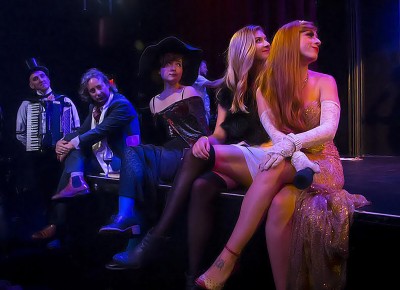
It’s called The Poetry Brothel, but it’s not quite what you think.
For the first time, the New York-based organization visited Cambridge Friday at the OBERON stage at The American Repertory Theater at Harvard University, bringing a menagerie of tarot card readers, body painters, burlesque dancers and — the heart of the show — the “poetry whores.”
Despite provocative terminology, The Poetry Brothel show is centered around the raw honesty of poetic words. As Master of Ceremonies Mister Charley exclaimed to the crowd, their goal is to “capture your souls, burn your hearts and challenge your vocabulary.”
“We really love poetry, and for us, it’s really important how you present it,” said Stephanie Berger, co-founder of The Poetry Brothel and glitter-clad madame of the show. “And why would you create a poetry reading that wasn’t as beautiful as the poem itself?”
To create this “festival of the senses,” as Berger called it, guests are welcomed into a turn-of-the-century venue with shadowy colors bouncing off the walls and live accordion music drifting from the stage. Dark velvet curtains decorate the stage, where the poets stand to introduce themselves and recite a few lines of their work. Each has a different story. There’s a dreamy sea-witch, a dark gypsy, a travelled ventriloquist and a mournful exile.
Tucked away on the sides, surrounded by drapes and hushed conversations, are the rooms reserved for private readings, which you can buy from each poet with a purchased token. But the poems aren’t all sex and lust. Each poet has its specialty — travels, family, loved ones and lots of “punchy feminist stuff,” as “cursed soothsayer” Hortensia Celeste described her work.
The poets take pride in their work and their characters, Berger said.
“I feel like ‘poetry whores’ are amazing, beautiful kinds of creatures,” Berger said, “because they have both the ability to perform their poetry in a way that’s really compelling on the stage, but they also have the ability to connect with other people … and create a form of intimacy around their work.”
Though passion and positivity seem to surround the environment, anti-oppression activists and current sex workers have strongly spoken out against the concept of The Poetry Brothel, mainly on the event’s public Facebook page.
Although the combination of poetry and sexual themes is a form of expression many find comfort and excitement in, critics argue the issue requires much more than a quick internet search or a single interview. It goes deeper than one night of burlesque dancing and reciting poetry in costume, commenters write.
“You don’t get to call yourself a whore until you fear law enforcement, violent clients, judgement from healthcare providers, stigma from loved ones, and being outed at great cost to your personal safety,” read one review on The Poetry Brothel’s Facebook page.
Despite the criticism, The Poetry Brothel doesn’t look like it’s going anywhere just yet.
“It just tells us that we’re doing something that’s hitting a nerve for people,” Berger said about negative reviews, “and I think that’s a really good thing. Having that conversation with that community has been a positive thing, just to clarify what we are doing and what we do mean when we’re using that sort of language.”
As both critics and fans sometimes get too caught up in the sexual pretense, the group has to constantly clarify its concept, said Kelly Dochy, one of the “poetry whores” who goes by the stage name “Lady Lucifer.”
“It’s really about the poetry and making poetry engaging,” Dochy said. “There is an aspect of sexuality to it, but it always comes back to poetry, to the art.”
Still, audience members admit they revel in the controversy.
“I like seeing people take what is seemingly a weakness and turning it into a strength,” said Kathryn Smith, 23, of Newmarket, New Hampshire. “That’s a very empowering concept.”
Of course, the line between art and reality can become a bigger deal when talking about a line of work that can result in murder and rape.
But amidst the debate, The Poetry Brothel management is hardly about to slow down. According to Berger, they’re hoping to continue forward and open a permanent branch in Boston.
“It’s something that we really believe in and enjoy,” Berger said, “and it makes us feel good about our sexuality … so I think it’s a really positive thing because of that.”




















































































































